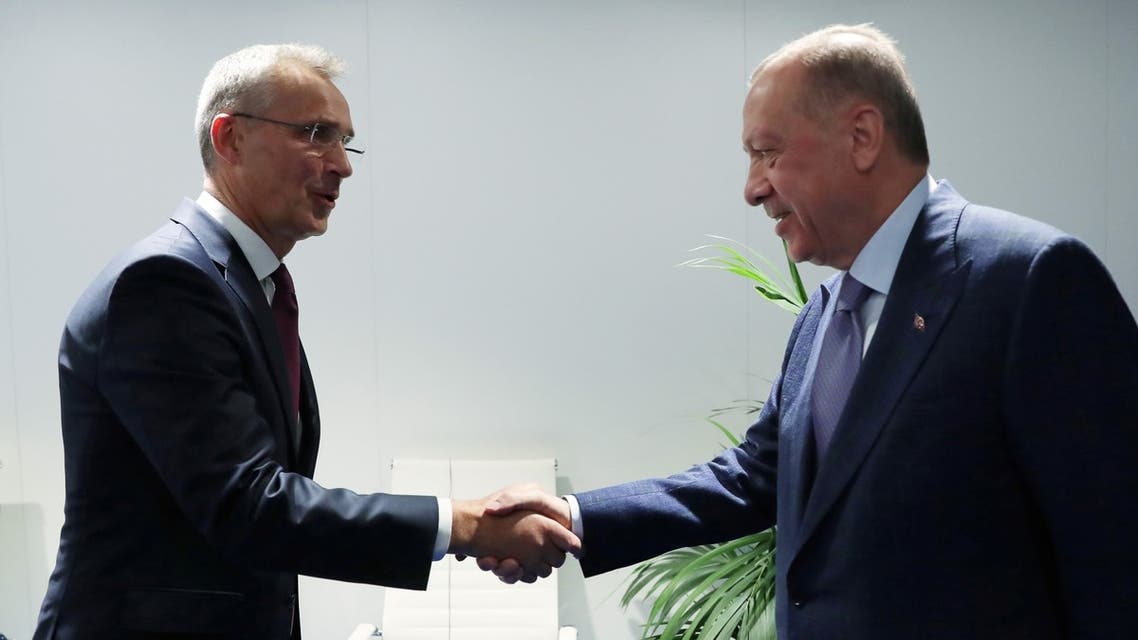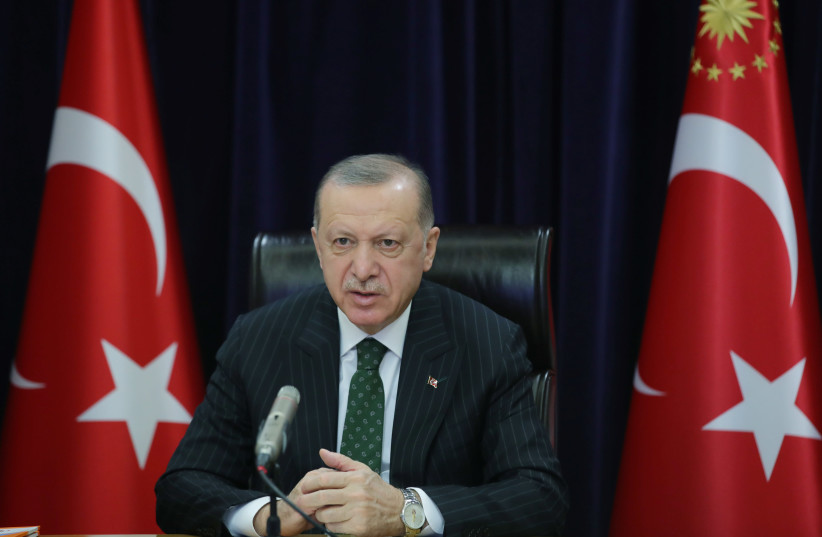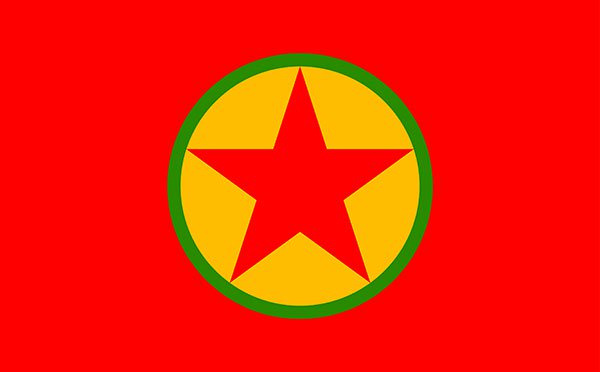
This handout photograph taken and released on June 28, 2022 by Turkish Presidential press office, shows Turkey's President Recep Tayyip Erdogan (R) shaking hands with NATO Secretary General Jens Stoltenberg before the four-way talks on Sweden's and Finland's NATO application ahead of the NATO summit in Madrid. (AFP)
Tuqa Khalid, Al Arabiya English
Published: 28 June ,2022:
Finnish president Sauli Niinisto said on Tuesday that Turkey has agreed to support the NATO memberships of Finland and Sweden, and Ankara said it “got what it wanted” from the talks with the two Nordic countries.
Niinisto said the decision came after a meeting with Turkish President Recep Tayyip Erdogan and Swedish Prime Minister Magdalena Andersson, facilitated by Secretary General of NATO Jens Stoltenberg.
“As a result of that meeting, our foreign ministers signed a trilateral memorandum which confirms that Turkey will at the Madrid Summit this week support the invitation of Finland and Sweden to become members of NATO,” Niinisto said in a statement.
“The concrete steps of our accession to NATO will be agreed by the NATO Allies during the next two days, but that decision is now imminent,” he added.
The memorandum underscores the commitment by the three countries to “extend their full support against threats to each other’s security.”
Sweden and Finland sought to enhance their security through NATO membership, ending decades of military nonalignment in an historic move driven by Russia’s invasion of Ukraine.
Turkey declared in May it had objections to the two countries joining NATO, accusing them of supporting Kurdish militants, namely the Kurdistan Workers Party (PKK), whom Ankara considers to be a terrorist organization, and failing to extradite dozens of suspected “terrorists,” specifically the followers of Fethullah Gulen, whom Ankara accuses of orchestrating a 2016 coup attempt.
The Turkish Communications Directorate said on Tuesday that Finland and Sweden agreed on full cooperation with Turkey in the fight against the PKK and its affiliates, state news agency Anadolu reported. “Turkey got what it wanted.”
Read more:
Sweden’s Kurdish diaspora fear they may pay price for NATO bid as Turkey fumes
Sweden to toughen its anti-terrorism law under deal with Turkey — statement
ANKARA, June 29. /TASS/. Sweden is to toughen its law on terrorism-related offenses from July 1 under an agreement reached with Turkey, according to a memorandum, signed by the Turkish, Swedish and Finnish foreign ministers in Madrid on Tuesday.
"Sweden confirms that a new, tougher Terrorist Offenses Act enters into force on 1 July, and that the government is preparing further tightening of counter-terrorism legislation," the document says.
Turkish and Finnish Presidents, Recep Tayyip Erdogan and Sauli Niinisto, Swedish Prime Minister Magdalena Andersson, and NATO Secretary General Jens Stoltenberg gathered in Madrid on Tuesday to discuss issues of Sweden’s and Finland’s NATO membership in light of Turkey’s refusal to support their admission unless they issue written guarantees to Ankara that they will refuse from supporting terrorist organizations, lift the weapons embargo and restrictions imposed on Turkey in the defense sector.
After the talks, the three countries’ foreign ministers signed a memorandum in the presence of the leaders. A spokesman for Erdogan’s office told TASS that Turkey has achieved the moves it wanted from Sweden and Finland to agree to their accession to NATO.
By backing Ankara, Tehran expects it will have free rein in southern Syria to threaten Israel.
By SETH J. FRANTZMAN
Published: JUNE 28, 2022

Turkish President Tayyip Erdogan attends a meeting of his ruling AK Party via video link in Ankara, Turkey March 4, 2021.
(photo credit: PRESIDENTIAL PRESS OFFICE/HANDOUT VIA REUTERS)
Iran’s foreign minister appeared to indicate that Tehran would not oppose a Turkish invasion of another part of Syria.
Turkey invaded Syria in a series of campaigns beginning in 2016, eventually resulting in the ethnic cleansing of hundreds of thousands of Kurds and minorities from Afrin, Sere Kaniya and other areas.
Ankara’s goal is to use part of northern Syria as a kind of new colony, where it will force Syrian refugees to move and displace other Syrians. The goal is demographic change, removing Kurds, Yazidis, Christians and other minorities and putting mostly Arab refugees in their place, and then using pro-Turkey extremist groups to police the area.
The regime has already followed this model in several areas, which are now home not only to displaced Syrians but governed by armed religious extremist gangs, many of which engage in kidnapping, rape and extortion. Some of these groups have been sanctioned by the US, and many of the areas are infiltrated by al-Qaeda, Hayat Tahrir al-Sham and other extremist groups that are labeled as terrorists.
Ankara has vowed over the past year to launch a new invasion. However, the green light it had from the Trump administration to invade areas of Syria and attack US partner forces has been turned to red under the Biden administration. The US has backed the Syrian Democratic Forces, a force that includes Kurds, Arabs, Christians and other groups.

The SDF, which controls eastern Syria, played a key role in defeating ISIS. Turkey, by contrast, enabled most of the people who joined ISIS to cross into Syria.
During the Obama years, the US began to open a relationship with the Kurdish anti-ISIS fighters, then known as the YPG. Those groups in turn have a political leadership called PYD. Turkey views them all as being linked to the PKK, which Ankara views as a terrorist group.
Iran also views them as linked to the PKK, but in the past has had a more nuanced view on the Kurdish issue. Today, Iran has shifted that view, and wants to encourage Turkey to fight the Kurds because it can then swoop in with the Syrian regime to grab any area that the US might be encouraged to abandon. Tehran’s gamble is thus cynical: it wants to use Turkey to get part of Syria, and then use that part to threaten Israel.
This means that Iran’s backing of Turkey is also a threat to the US and Israel, because Tehran wants to work with Ankara to expel any groups linked to the US so that they can divide part of Syria. Then Iran can be allowed to traffic weapons and drugs more easily in southern Syria.
Turkey, meanwhile, has another agenda. It wants to blackmail NATO into backing or at least being quiet about its destabilization of Syria to receive concessions from the military alliance regarding Finland and Sweden joining it. Although Turkey is a part of NATO, it tends to work more with Russia and Iran.
TURKEY IS opposed to NATO values, such as human rights and democracy, and wants to use its membership to obtain profits. As part of this, the regime boasts that it has the largest army in NATO. That army is directed toward attacking minorities in Syria, bombing Yazidis in Sinjar, and attacking Iraqis. It also takes delivery of Russia’s S-400 anti-missile defense system, but Ankara knows it can intimidate NATO by claiming to be its southern flank linchpin.
As such, Turkey threatens Greece and Cyprus, as well as the US, but puts its finger on the veto button when it comes to Finland and Sweden joining the alliance. In short, Ankara is able to hold NATO hostage. This is why it meets with the Iranians: it wants to show it has friends in other places.
“We understand Turkey’s security concerns very well,” Iranian Foreign Minister Hossein Amir-Abdollahian told reporters after talks in Ankara with his Turkish counterpart, Mevlut Cavusoglu. “We understand [that] maybe a special operation might be needed. Turkey’s security concerns must be tackled fully and permanently,” Al-Arabiya quoted him as saying.
A “special operation” is the same term used by Russia in its invasion of Ukraine. Turkey is learning from Russia and vice versa. For instance, both have used food as a weapon and enabled extremists in their invasions. Turkey mobilizes poor Syrians and encourages them to join extremist proxy groups; Russia uses the people of Donbas to fight. Russia steals Ukrainian grain; Turkey steals Afrin olives. Iran uses proxies as well.
Thus, the Russia-Turkey-Iran triumvirate works together. They also divide Syria for their own needs. Using the Astana “peace” process, these three countries carve up Syria – and see the US-influenced area in the east, where the SDF is located, as the one thing blocking their control.
Thus, Turkey wants a new invasion to get some new concessions from the US and NATO, and also to get closer to Russia and Iran. It can tell Moscow that if it gives it more of Syria, then Ankara may support Russia’s invasion. Turkey tells NATO that if it backs the invasion, then it will let Finland and Sweden join.
Turkey tells Iran it will support it taking over southern Syria so it can threaten Israel. Turkey then tells Israel’s foreign minister that it will work against Iranian plots on Turkey soil. Encourage Iran to use Syria instead – that is how Ankara thinks of this policy.
In this way, Turkey uses each country against the other – NATO against Russia, and Iran versus Israel – and Ankara plays both sides for its own benefit.

The 1970s saw Kurdish nationalism branching off into Marxist political ideology which influenced a new generation of Kurdish nationalists. A group of radical Kurdish students led by Abdullah Öcalan in Turkey formed the militant separatist group called Partiya Karkeren Kurdistan (PKK), or Kurdistan Workers’ Party in English.[1]
The PKK’s ideology was originally a fusion of revolutionary socialism and Kurdish nationalism which was intended to be used as the foundation of an independent, Marxist–Leninist state known as Kurdistan. The PKK fought an armed struggle against the Turkish state for cultural and political rights and self-determination for the Kurds in Turkey.
Early PKK History
In it’s early days (1978–1984), the PKK tried to gain the support of the Kurdish population in Turkey by attacking the machinery of Turkish government and distributing propaganda in the region. PKK tactics were based on ambush, sabotage, riots, protests, and demonstrations against the Turkish government.
During these early years, the PKK fought a turf war against other predominantly Kurdish organisations in Turkey. In all of Turkey, this period was characterized by violent clashes that resulted in de-stabilizing the Turkish Government. The PKK has continued their guerrilla-type militant offensive for over thirty years.
The PKK, also known as KADEK and Kongra-Gel, is internationally listed as a terrorist organization by several states and organizations, including the North Atlantic Treaty Organisation (NATO), the United States, and the European Union (EU).
Abdullah Öcalan and the PKK
In the late 80’s and early 90’s, the PKK’s leader, Abdullah Öcalan, was staging raids into Turkey from Syria. In response, the Turkish Government launched an intensive counterinsurgency offensive and forced Syria to stop letting Öcalan use Syria as a base of operations.
When Öcalan was forced to leave Syria, he was arrested in Kenya and extradited to Turkey for prosecution. Although he was convicted and sentenced to death in 1999, the Turkish Government converted the sentence to life, as it was concurrently applying for membership in the EU, where capital punishment was banned.
PKK Peace Talks and Democratic Confederalism
In March, 2013, after several false starts in establishing peace between the Turkish Government and the PKK, Kurdish officials read a statement from Öcalan that he issued from prison stating “We are at a point today when the guns will fall silent and ideas will speak. It is time for armed fighters to move outside [Turkey’s] borders. This is not an ending, but a new beginning.”[2]
So far the ceasefire has held, Öcalan made calls for peace, and has followed up with his idea for a sustainable peace that he calls “Democratic Confederalism.” The philosophy behind this idea is that since Kurdistan has little or no chance to achieve independence in having its own State or any significant degree of autonomy. Consequently, “democratic confederalism” promotes democracy of people without a state, and enables people to gain power on a local level and achieve self-sufficiency within the framework of a Federated State.
References

No comments:
Post a Comment